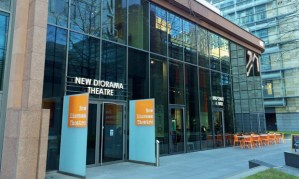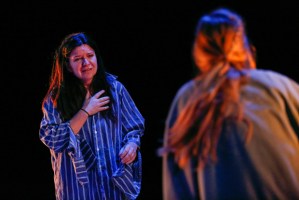Review: Kings (New Diorama Theatre)
Smoke & Oakum’s new play tackles issues of homelessness, with a magical twist
The first thing you notice when entering the New Diorama for Kings is designer Erin Green's looming, musty railway arches, placing us squarely in a south London underpass. A train rumbles overhead; this is our city, right now.
Writer and director Oli Forsyth presents three homeless individuals, a de-facto family. There's Ebi, the former electrician blaming his poverty on jobless immigrants, Bess, a stubborn denier of her drinking habit, and the young Hannah, hooked on all manner of narcotics. A fictional tale set in pressing, contemporary circumstances.
Caz arrives, a stranger, capable of magic. The supernatural grows more extreme, and card tricks turn into refilling empty bottles of whiskey or dismantling padlocks with a touch. The status quo changes as all but Bess are seduced by the miracles. If the parallels weren’t explicit enough, Forsyth has Hannah exclaim: "Like Jesus you are, come here to save us". The play starts to become a surreal fantasia, and for a moment anything feels possible.
All of this becomes irrelevant. There is no escapism here, and as the group continues to live under the arches the realities of living homeless are unavoidable. Kings does not pull its punches, attacking the apathy that currently exists, and no amount of magic changes things.
There are great turns by the cast in bringing these issues to light. Madeleine MacMahon (after a staggering performance in this Fringe’s A Super Happy Story) brings a jittery, ceaseless energy to Caz, who, though mysterious in her magical ways, never feels distant. Emma James and Libby Liburd infuse Hannah and Bess with a natural physicality, while Andy McLeod, dealing with perhaps the only underwritten character, makes the best of benign patriarch Ebi.
Kings has some standout moments. Caz, Ebi and Hannah break into a cinema, to watch a documentary about global warming. "If you’re sleeping in a tent, global warming can’t come soon enough" Hannah spits, and the problematic juncture between caring for our planet while ignoring our fellow citizens becomes obvious. Under the humour, the anger bristles.
But it's all a lot to digest for a 75-minute play and some plot beats rush by. Characterisation is sacrificed in favour of placing individuals where they need to be for the next set piece. By the end of the play, Forsyth has placed more emphasis on the themes than those trying to demonstrate them onstage.
It's hard to miss the rawness to the show's message. Even when Hannah is lambasted by the group for becoming intentionally homeless despite being given a house by the welfare system, the complexities are there. "I needed help, not a room", she pleads. Hand-outs need to be structured and sustained, rather than a one-off. Giving someone four walls is never enough if you don't give them support, or a family. Both are needed to make a home.
Kings runs at the New Diorama Theatre until 21 October.















